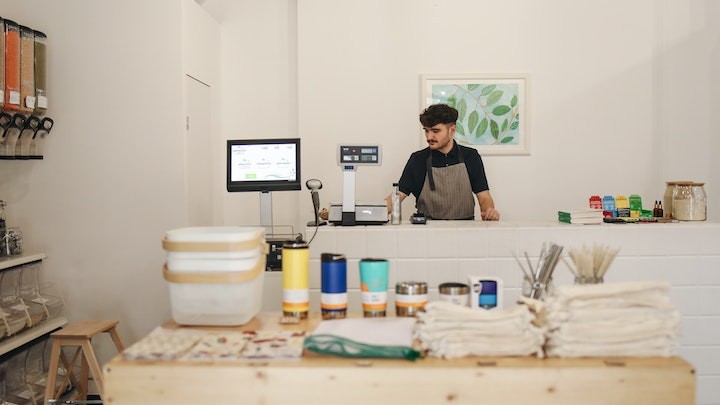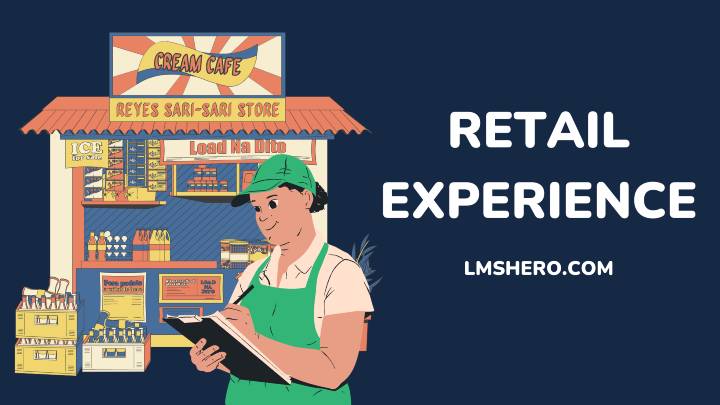What does it mean to have retail experience, and what are the benefits of having retail experience? If you’re looking for your next retail job, these are important questions that should be answered.
This article explores what it means to have retail experience and why retail experience is important and how to acquire them.
What does retail experience mean?
The term “retail experience” describes how a retailer deals with customers in order to offer particular products or services. This can be done by looking at a store’s inventory in person, online, or by getting in touch with the business by phone or email.

Depending on their sector and the products they sell, people with retail experience offer varying levels of service.
While some clients would like a fully personalized experience, others might only want to swiftly and effectively purchase what they require.
Employees in retail establishments frequently assist customers in making shopping decisions.
What counts as retail experience?
Directly or through a wholesaler, retail experience entails working for retail businesses that buy products from producers to sell to consumers.
As the last businesses in the supply chain system, which starts with a manufacturer and finishes with a buyer, retailers play a crucial role. in meeting customer needs.
Working in a retail establishment differs from other workplaces in a few key ways, including the following:
- Small-scale sales of goods and services as opposed to large-scale sales by wholesalers
- Direct interaction with clients or customers
- Attractive store designs to market and advertises products
- Unusual work schedules and shifts that may change depending on the shopping season
If you have retail experience, you’ve likely worked at some of the following establishments:
1. Discount stores
In discount stores, retailers offer goods for less than they would at regular prices. Discount retailers depend on wholesalers or manufacturers for a steady supply of goods at low costs.
Typically, these shops sell a wide range of goods, including food, apparel, accessories, appliances, home furnishings, and other things.
2.. Off-price stores
High-quality items that are out of season are sold at a discount from their original retail cost in off-price stores. Products could include canceled orders, returned goods, or extra stock.
It may be required to convert retail prices to promotional rates and examine incoming merchandise for substantial damages when working at an off-price establishment.
3. Supermarkets
Supermarkets are a type of grocery store where customers may purchase a vast selection of food items.
Outstanding at providing excellent customer service, supermarket employees may be required to lift and unbox things or move carts depending on their job.
4. Specialty stores
Specialty stores are a sort of retail business that sells a few different kinds of related goods. Electronics shops, sporting goods shops, jewelry shops, apparel boutiques, shoe shops, bookshops, and businesses offering home furnishings are examples of specialty stores.
Having extensive knowledge of or experience with the products the specialty shop sells is often required to work there.
5. Department stores
Department stores are retail establishments with numerous product departments, frequently spread across several levels.
For instance, a department store might feature sections for clothing, jewelry, home decor, and kitchen equipment.
Customers can shop for a variety of items in one place thanks to the existence of each of these dedicated zones.
6. Drug stores
Drug stores are retail establishments that sell food, toiletries, health products, over-the-counter medicines, and prescription-only medications.
Additionally, they could have a pharmacy that provides services like examinations and general health advice.
What job roles are common among people with retail experience?
While these job roles vary based on the retail establishment, common roles people with retail experience have once held or currently hold include;
- Department store manager
- Stockroom Assistant
- Appliance department manager
- Jewelry and accessories sales associate
- Customer service desk assistant
- Purchasing Assistant
- Specialty merchandise associate
- Retail sales associate
- Salesperson
- Tech support specialist
- Book Merchandise
- Product marketer
- Cashier
- Convenience store manager
- Convenience store assistant manager
- Store clerk
- Customer attendant
- Retail sales associate
- Store manager
- Store supervisor
- Customer service assistant
- Supplier relations specialist
- Cashier
Why is retail experience important?
Having retail expertise not only opens doors to management positions and high-paying retail employment, but it can also equip you with the know-how to launch your own business.
If an employee wants to pursue a more entrepreneurial career, they can use the same skills to manufacture or sell their own goods or services with a genuine client in mind and boosts sales.
Additionally, an employee’s business skills, customer service abilities, communication skills, etc. can all be improved with retail experience.
How to get retail experience
Retail stores are often in need of retail assistants or entry-level retail jobs with no prior experience in retail. You could easily apply for these roles, and get your training on the job.
If you are aware of the business you desire to work for, you may begin a job search there by going to the “Employment” section of their official website and filling out an application.
You might also need to go to the business to fill out an application if you’re applying to a neighborhood or independent retailer.
If you want to build a solid experience in a range of various product sectors, a department store is a wonderful place to work in retail.
Another beneficial setting for new retail employees to learn how to sell a variety of goods is working in a physical store like a supermarket or discount store.
FAQs
Can fast food jobs offer a retail experience?
Yes, fast food jobs offer retail exposure as many diverse tasks are included in fast food occupations.
This includes operating a register, assisting customers with their inquiries and problems, setting up inventory exhibits, and unloading vehicles.
How do you explain retail experience on a resume?
To explain your retail experience on a resume, consider your relevant qualifications and experience, then write a simple but compelling summary.
If you have retail experience, include a summary on your resume detailing your roles in previous retail jobs. Make sure it clarifies things.
What are the benefits of working in the retail industry?
Retail jobs teach you to interact and communicate with others.
Your tolerance level also rises as a result. If you’re looking for an entry-level position with no experience and want to work flexible hours, retail jobs are fantastic.
Conclusion
Retail experience is a huge deal these days. With the continued e-commerce boom and consumers’ preference for shopping online, retail job opportunities have increased dramatically lately.
This has made a lot of people rethink their career options and decide they want to become store managers or assistant managers at major stores like Macy’s, T.J.Maxx, and Target.
Retail experience is an important factor in being a successful store manager or assistant manager.
However, many people are not aware that it can be beneficial in many ways including earning more money, improving chances of getting hired by a higher position later on in your career, and preparing for a job that requires customer service skills.
Finally, working a retail job for a long time can sometimes have a negative impact on your mental health. Here are ways to identify the psychological effects of working a retail job and how to cope on the job.
I hope you found this article helpful. Thanks for reading.







